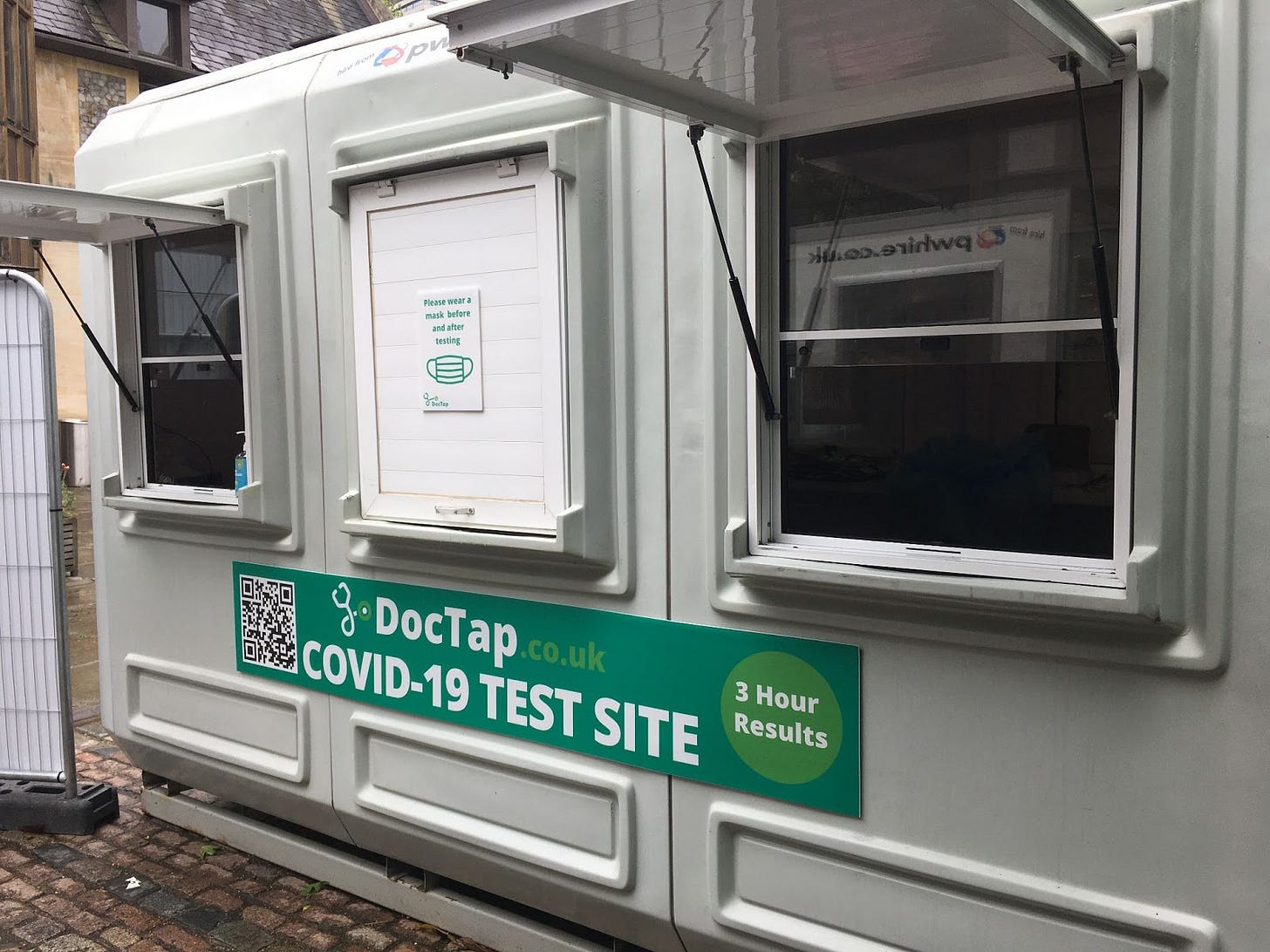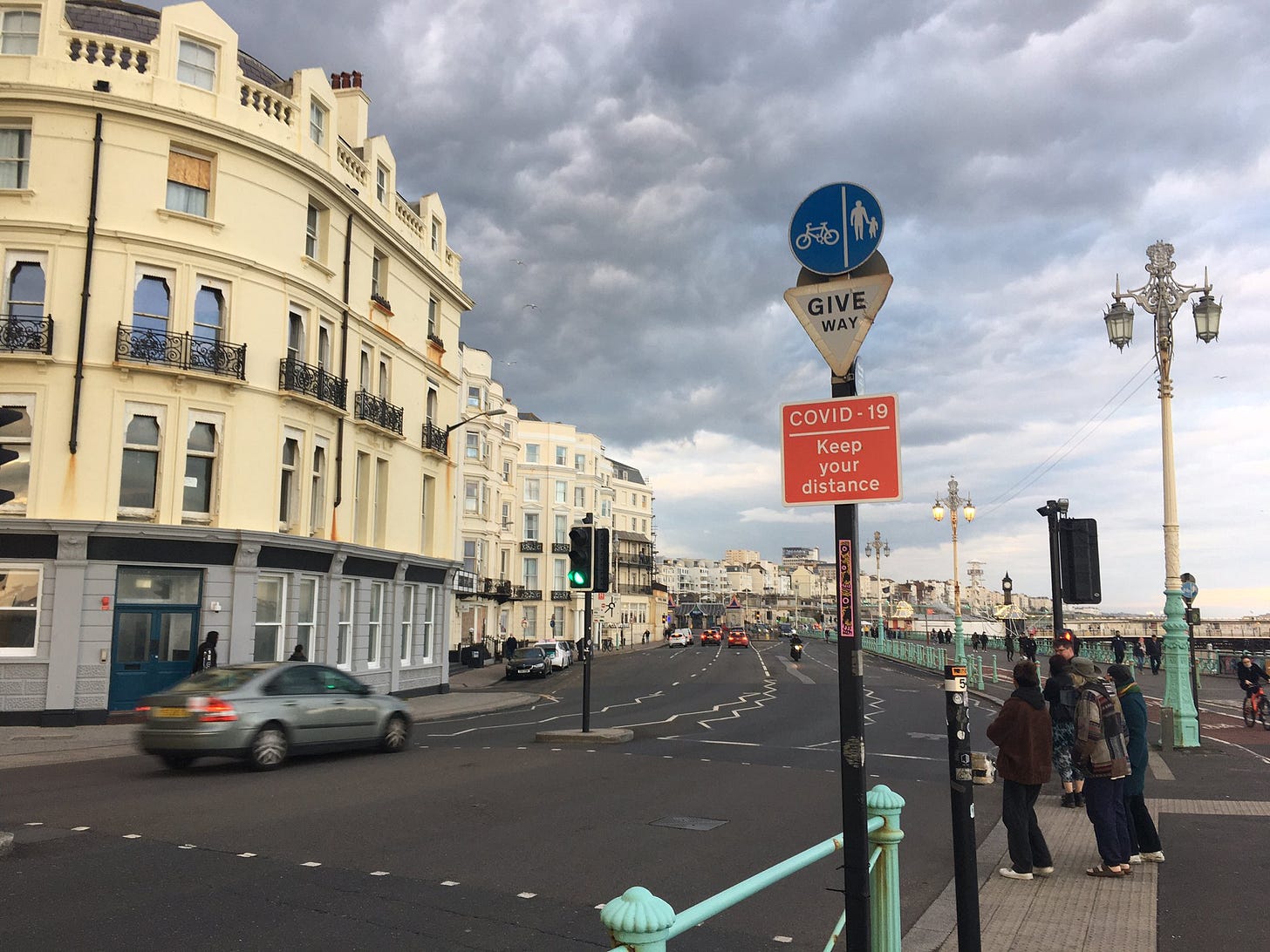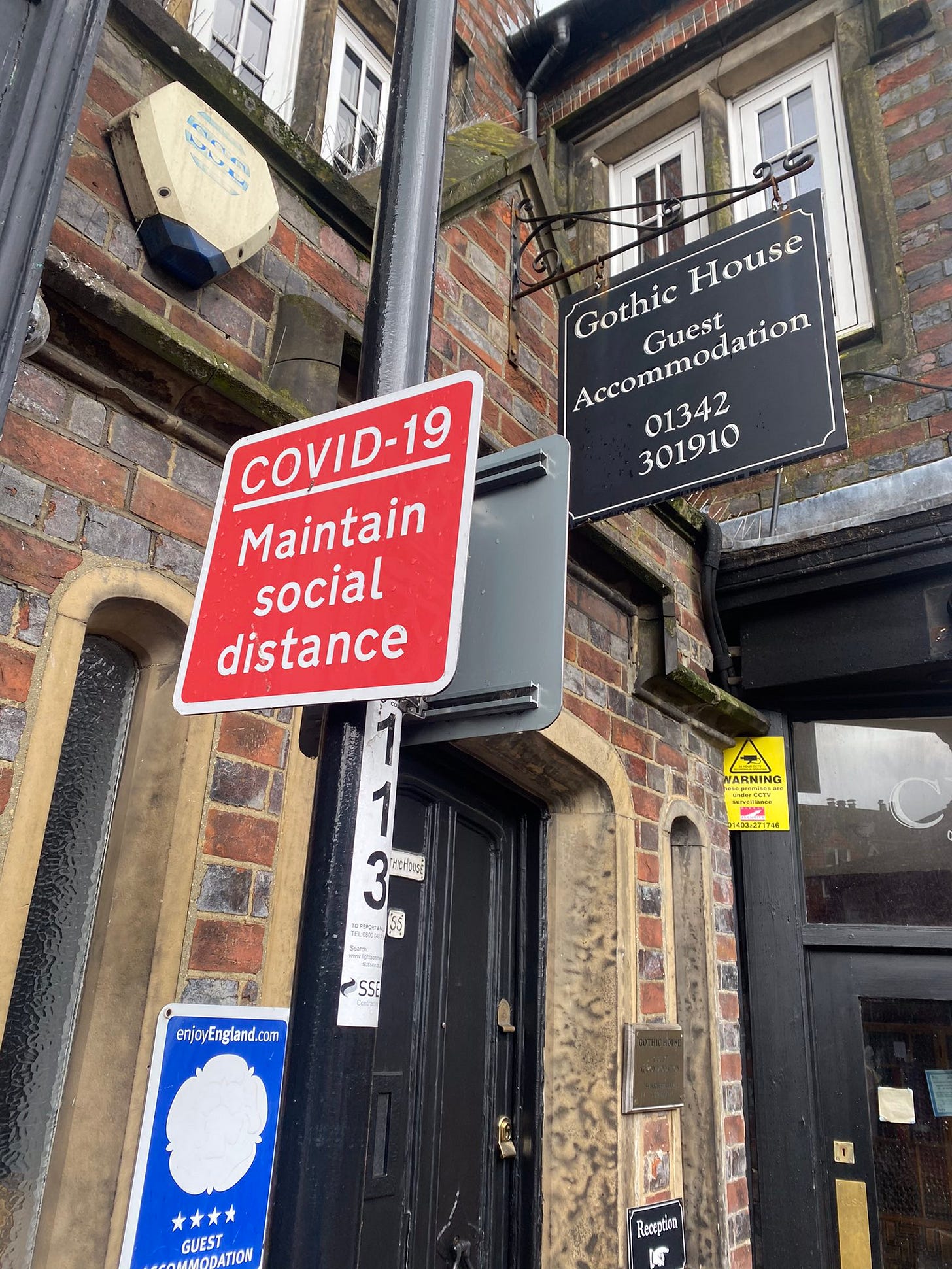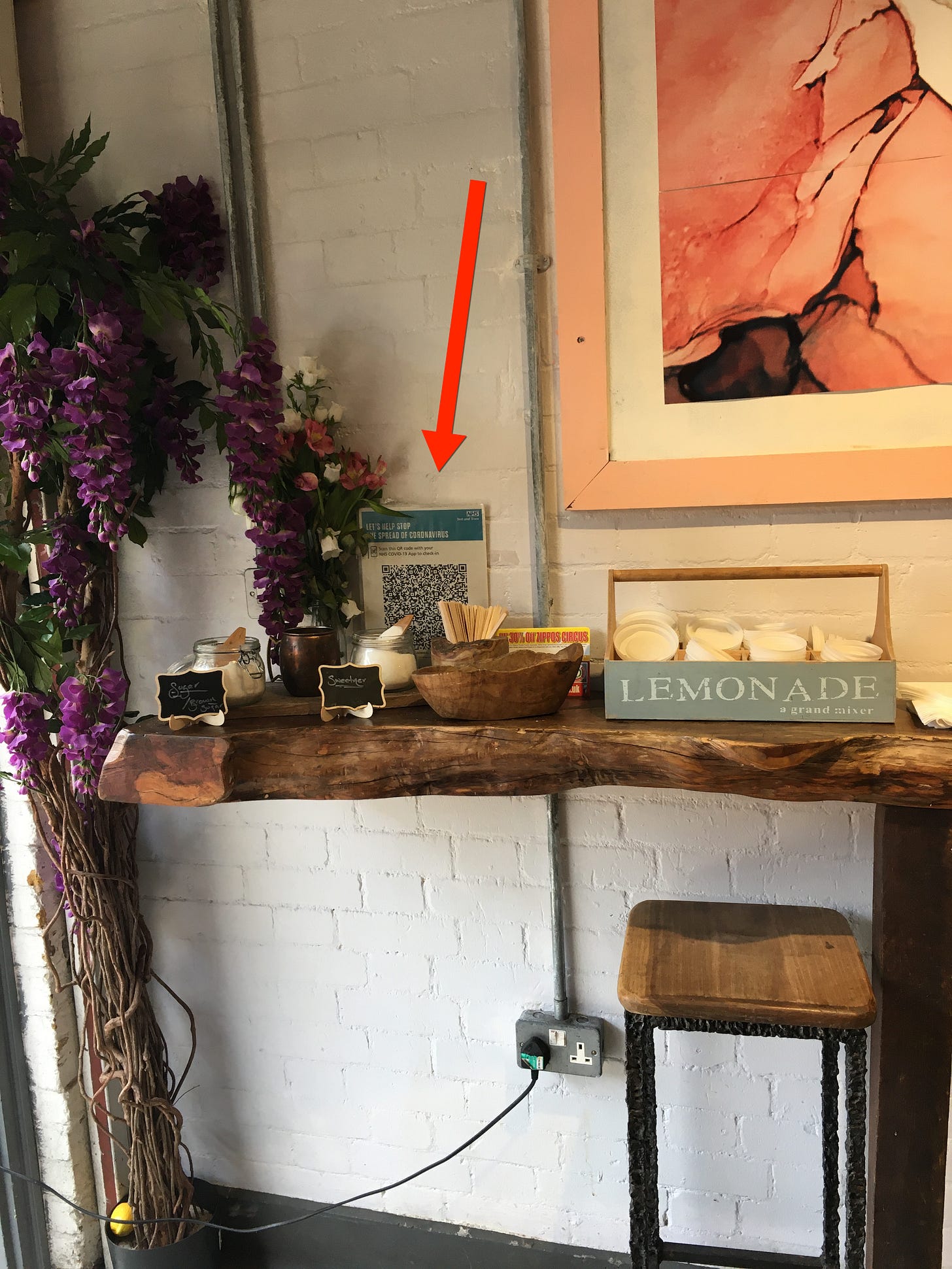Unsurprisingly, COVID Testing For International Travel Is A Bit Of A Scam
I returned from a trip to the UK a few days ago, and a number of people have asked me about the COVID-related bureaucratic protocols I had to navigate in order to take such a trip. So I thought I’d share a few observations. (Overnight leisure hotel stays within England were permitted beginning May 17 and I arrived May 20.) The bottom line is that the protocols in place at this point are mildly annoying and probably financially exploitative, but ultimately not that big a deal to manage. Apologies for the decidedly un-salacious thesis statement, but the bland inefficacy of the whole regimen is what stands out most.
Maybe the most irksome aspect of the experience from a policy standpoint is that I am fully vaccinated — thanks to Donald Trump’s groundbreaking socialized medicine initiative — but this had no bearing on the measures I was required to comply with in order to effectuate international travel. In other words, I might as well not have been vaccinated, insofar as it had no practical effect on anything travel-related. I brought along my shiny, laminated CDC card proving my vaccinated status, but at no point was there ever an opportunity to present it to anyone in charge of dictating whether I was able to move through a travel barrier — customs agents, airline attendants, etc. To put it another way, being vaccinated did not enhance my ability to move freely between the US and the UK. This seems silly, especially considering a key policy goal at the moment in both the US and UK is to incentivize people to get vaccinated. Perks like lottery tickets and beer are being offered to achieve this goal. Another compelling incentive to get vaccinated would presumably be that upon doing so, one can resume enjoyable activities like travel with minimal hassle. But that was not the case with respect to my travel between two of the most vaccinated countries in the world.
I guess it’s possible that I could’ve fabricated my CDC vaccination card, and therefore one could argue that not accepting it for any travel-related purposes is warranted as a fraud-mitigation measure. But I didn’t fabricate the card. So you’d think there would be some way for people to cite their actually-vaccinated status as grounds to travel without restrictions between these two advanced nations. Like many people, I am wary about the civil liberties implications of a “vaccine passport” system, but you’d think being vaccinated would enable you to avoid various bureaucratic roadblocks to engaging in normal activity. I thought that was supposed to be one of the benefits of being vaccinated, but it was effectively irrelevant on this trip.
Instead I ended up getting a total of four COVID tests to facilitate my travel, three of which seemed suspiciously expensive. The first test I got in NYC, three days before departure, because I was told I had to show proof of a negative result to both the airline and UK customs inspectors. That cost $175. A less-expensive home test was not an option as far as I could tell — someone can correct me if I’m wrong — because there was no way to provide time-sensitive verification of the result to the relevant authorities. The fact that prospective travelers must pay $175 for approved tests 15 months into the pandemic seems ridiculous and likely exploitative. There’s no way the rapid antigen test actually costs anywhere near that much to conduct. Also, if I had been in a document-fabricating mood, I could’ve fabricated the resulting “Congratulations, You Tested Negative” document, because neither the airline attendant nor the UK customs inspector bothered to verify the authenticity of the printout I presented them. United Airlines at Newark Airport actually didn’t even bother checking my test result until I proactively asked about it, having been curious as to why nobody had requested to see this thing I paid $175 for.
To enter the UK, I was required to sign up for the online Passenger Locator system through the Home Office. This entailed pre-booking another test on my second day in the country. So I pre-booked a test in London. This cost $182.52.
As you can see by the large text on the banner, the test was supposed to yield results in three hours, but I didn’t get the results via email for approximately 24 hours.
Ostensibly the idea was that my test result would be automatically uploaded into the Passenger Locator system, but I saw no evidence that this actually occurred. Come to think of it, I probably could’ve gotten past the UK customs agent at Heathrow Airport without ever having registered for the Passenger Locator system in the first place. But as an obedient foreigner I did so anyway, and consequently was called or texted each day of the trip by a conspicuously low-level National Health Service employee to check vaguely on my status. They didn’t really check anything, though. Mostly these employees just nervously read a script and requested a few uninformative yes/no answers to simple questions.
As a technical matter, I was required to quarantine for 10 days upon entry into the UK. I will neither confirm nor deny whether I satisfied this requirement. It was warned that civil service officials may come to physically see if I was present at the quarantine address I provided, but no visit ever occurred. Just the daily lackadaisical call and/or text.
There was a “test-to-release” scheme that I was theoretically enrolled in, whereby on Day 8 I could cease quarantining upon receipt of yet another negative test result. So I went and got another test on Day 8, this time at an NHS pharmacy. But as far as I could tell, there was no way to submit this test result to the “test-to-release” system. And it didn’t really matter anyway because functionally, no one was checking.
I thought this free NHS test would cover me for the return trip. But when I arrived at Heathrow Airport for my flight back to the US, I was told by a United Airlines person that NHS tests are not accepted for travel. Which seemed like an unfortunate slight of the UK’s single-payer healthcare system. Instead I had to go to a portion of the airport where private COVID tests were being administered. That cost another $56.83.
The flights themselves were pleasant because the plane was probably less than a third full each way. Had an entire aisle to myself! Although one time a stewardess reprimanded me for briefly not wearing a mask. I considered trying to explain that I was drinking water, an activity that is not compatible with mask-wearing, but just complied and then resumed my water consumption when she was out of eyesight.
So in conclusion, these convoluted COVID regimens are of dubious utility for curtailing COVID, but represent a big payday for various private test providers. Upon return to the US, I wasn’t asked any questions at all about my COVID status by the customs agent at Newark Airport. Instead I had to declare the value of a new jacket I had purchased.
A few more observations. Walking around outdoors in the UK was the first time since March 2020 I had walked around outdoors with no expectation of widespread mask use. I have ceased wearing masks anyplace it’s not required since being fully vaccinated, but it was still something to adjust to. Despite England’s relatively stringent COVID protocols in every other respect — including a third lockdown with a “stay-at-home” order that wasn’t lifted until March 29, with shops not reopening until April 12 — outdoor mask use had never been mandated or even really socially encouraged. Meanwhile for the longest time, the park across the street from me in New Jersey has required a mask for entry. As recently as last month I heard cops barking at people over a loudspeaker to wear masks while in the park. And in other jurisdictions kids are still being required to wear masks when they play outdoor sports. Seems dumb.
I also noted that there are permanent or quasi-permanent road signs in England related to COVID. Haven’t seen this anywhere in the US.
Both pedestrian and vehicular traffic patterns have allegedly been modified to allow for greater social distancing.
Only one customer permitted in this shop at a time!
Probably the silliest system is the “track-and-trace” QR Codes that you’re apparently supposed to scan with an NHS smartphone app upon entering certain establishments. But this isn’t meaningfully enforced most places and seems to make no difference to anything, except as a kind of ornamentation signifying vague concern with COVID.
…Meanwhile, UK citizens still can’t enter the US! Womp womp.










Mmm hmm. This is all to be expected during a Scamdemic. Yes, COVID is real. The response to it is not.
But, get used to this level of using fear to eradicate people's rights. This was the test run. You've all failed.
Dr. Fraudci knew that masks were ineffective against the virus from the start. Go read his emails. That didn't stop him from encouraging their use, and because he did, signaling to all forms of government to start mandating their use as medical theater.
The science has never mattered because this was all about political science.
Congrats on getting jabbed with an experimental vaccine whose long term side effects are not going to be known for some time. It really gave you your freedom back, right? The freedom that you asked the government to take from you? Oh, wait, you never asked them to do that. Oops.
To state the obvious: this all seems dystopian. It would be an appropriate reaction, one year in, to a plague that had killed 50% of the infected population and permanently disabled another 40%, or to a disease that caused meningitis-or polio-like symptoms in half of cases.
To see daily life turned into a sci-fi hellscape over a virus that has a survival rate approaching 100% (99.36% in the UK, if you want to be pedantic, or 99.91% for Brits under 40), when vaccines are widely available, is terrifying. I find the performative post-vax mask-wearing here in the US worrying as well.
I lived in Mile End for a year, getting a grad degree at Queen Mary, and London seemed like a fairly gray and bleak place even before this change.
I know that Australia plans to stay in a kind of on-and-off state of martial law until there are literally zero cases—shutting down life each time there are positive diagnoses—which means that in practice, it will never be over. It also seems clear that for about 40% of the US, masks, and a refusal to touch or approach others, will be a permanent virtue signal. In spite of the media’s desire to create fake “insurrections” and “super-spreader” events full of “grandma-killers,” regular people obviously aren’t inclined to rebel under any circumstances.
I guess there’s no hope, then, of returning to normality. Will the only surviving businesses be Amazon, Netflix and Google?